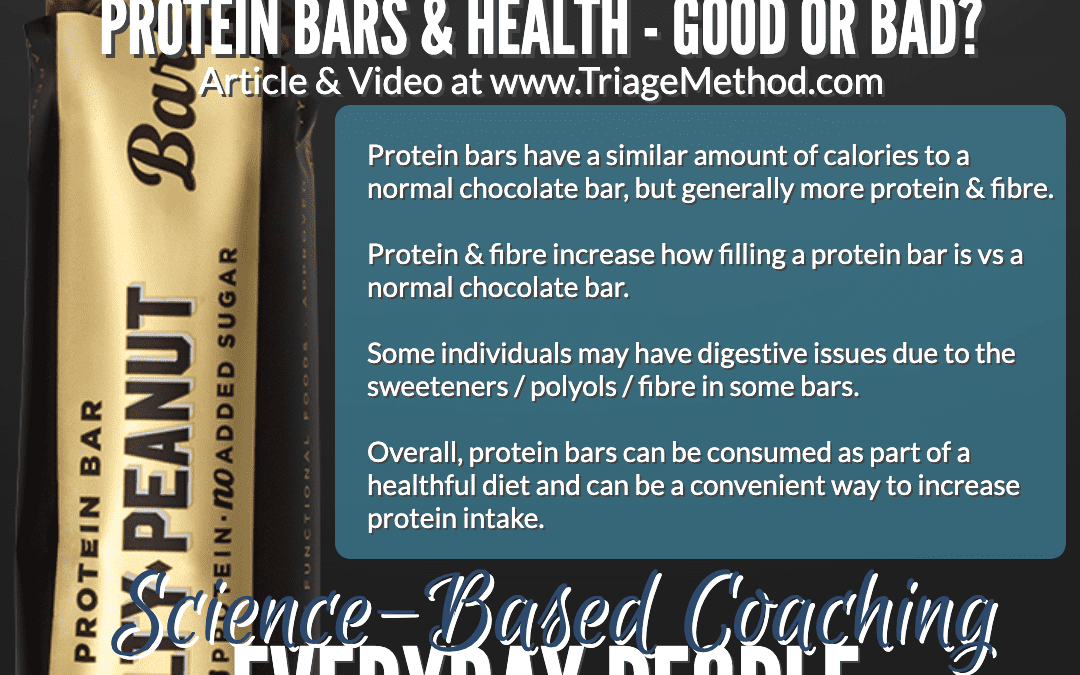A question that gets asked quite often is whether protein bars are ok to eat. In our opinion to answer this question we have to have a better understanding of what the person’s goal actually is.
Are we talking about protein bars being:
- A good food source to improve health?
- A good food source to improve your body composition?
- A good food source to allow you to adhere to your diet, while still fitting in life?
- A good food source to improve adherence by making you feel like you are eating something like a chocolate bar?
It really depends, and the goals have to be defined first.
But to give a more general answer, let’s very quickly look at the ingredients of a popular protein bar and classify whether any of the ingredients are bad for any health or body composition outcomes.
This whole question and discussion makes a big assumption that the rest of the diet and lifestyle variables are in place. So if calorie and macronutrient intakes are not accounted for, the whole question is redundant and thus so too is the discussion. The foundations (calories and macros) must be set before you can start building the walls (food selection). So ensure your diet is set up correctly, and you have good sleep and stress management protocols in place first and foremost.
One of my favourite protein bars is the mint chocolate flavoured Fulfil bars. So I am going to use that as our example.
Fulfil Milk Chocolate and Mint Protein Bar Ingredients
Milk chocolate with fibres and sweeteners 23,6% (cocoa butter, inulin, oligofructose, cocoa mass, whole milk powder, skimmed milk powder, sweetener (erythritol, steviol glycosides), emulsifier (soy lecithin), flavours), mint flavoured layer (bulking agent (polydextrose), cocoa butter, xylitol, skimmed milk powder, salt, emulsifier (citric acid ester (E472c)), colouring agent (titanium dioxide (E171)), sweetener (sucralose), natural peppermint flavour), milk protein, gelatine hydrolysate, humectant (glycerol), soy crisps (soy protein, tapioca starch, salt), soy crisp (soy protein, low fat cocoa, tapioca starch), soy oil, low fat cocoa, cocoa nibs, sugar mint (sugar, vegetable oil (shea oil, palm oil), flavours, colouring agent (copper chlorophyll), emulsifier (soy lecithin)), vitamins (vitamin C (ascorbic acid), nicotinamide, vitamin E (tocopheryl acetate), calcium pantothenate, vitamin B2 (riboflavin), vitamin B6 (pyridoxine hydrochloride), vitamin B1 (thiamin hydrochloride), folic acid, vitamin B12 (cyanocobalamin), salt, flavours (milk).
Protein Bar Analysis
Health
None of these ingredients stands out as being that bad, and although I generally wouldn’t base my food sources around soy protein (due to its “worse” amino acid profile compared to meat sources or dairy), every so often this is fine. So from an ingredient perspective, nothing on this list is that bad for health. It definitely could be better, and for certain populations (those allergic, or who get a reaction from any of the ingredients) it probably is a terrible food to base your diet around. Some people don’t handle flavourings or sweeteners well, so for those (believe me if this is an issue for you, you will know), protein bars are not an option. The only other thing that could be an issue for people is the fibres and polyols causing some gastrointestinal upset. This isn’t a huge issue for a “normal” population unless you plan on eating a lot of protein bars. However, if you are dealing with regular gastrointestinal problems, whether it is caused by some intolerance or FODMAP type issue, I would definitely avoid protein bars. It would actually be counterproductive to add protein bars into your diet if you are dealing with a gastrointestinal issue, regardless of the cause of those issues.
From a micronutrient standpoint Fulfil bars actually pack a punch, both in terms of the different micronutrients contained and the quantities:
- Vitamin E 11.8 98% NRV (Nutrient Reference Values)
- Vitamin C 78.7 98% NRV
- Thiamin (Vit. B1) 1.09 99% NRV
- Riboflavin (vit.B2) 1.37 98% NRV
- Niacin (Vit. B3) 15.7 98% NRV
- Vitamin B6 1.38 98% NRV
- Folic Acid 198.0 99% NRV
- Vitamin B12 2.46 98% NRV
- Pantothenic acid 5.9 98% NRV
So if your general food habits are poor, and as a result your micronutrient intake is poor, protein bars could be considered a health-promoting food. However, I would not be basing my diet around protein bars, especially in an attempt to get more nutrients in. For a variety of reasons, real food is way better to get your micro-nutrition from. Meat, veg, and fruit should be the foundation of your diet when considering micronutrient intake.
Body Composition
There are no ingredients on that list that would actively prevent someone from achieving their body composition goals. Protein bars may actually be of benefit when looking to achieve your body composition goals, not because of any magical ingredients but rather the convenience of being able to fit them into your calories and macronutrients. It may not always be possible to get access to a real food source, especially a protein-based one. So if protein bars increase adherence and ability to stay on plan, then perfect. However, this does not mean they should be used daily. They do not replace real food, and you should not be relying on protein bars regularly to hit your protein targets. This just suggests poor planning and laziness, if you constantly have to resort to eating a protein bar. But purely speaking of body composition, none of the ingredients (unless you have an issue with them specifically) will hinder your body composition goals.
Who should use protein bars?
If you are struggling for time and need to grab something quickly, then having a protein bar is a perfectly good food choice. For the extremely busy, protein bars are a godsend, and at Triage, we sometimes consume them when out and about at seminars/events or in different environments than your usual.
If you are using protein bars to “treat” yourself with a foodstuff that mimics another food item while still staying on track then that’s fine. If you are craving something sweeter than turkey or chicken breast or want to feel like you are indulging in a treat when out socialising, then by all means having a protein bar that fits into your calorie and macronutrient goals is perfect.
Who should NOT use protein bars?
If you are using protein bars as a crutch and are avoiding eating real food, then you really need to improve your eating habits and relationship with food. Protein bars are perfectly fine in moderation but if you are having one a day, there is likely something up with your diet as a whole or perhaps your overall relationship with food.
If you have digestive issues, I would generally avoid protein bars and work on your digestive health first.
Protein Bars Summary
Protein bars are perfectly fine both health-wise and physique-wise, however, I would be concerned if you were eating more than ~4 per week. Realistically they are meant for rare occasions when you don’t have access to the foods you would ideally like or to be used to “beat” some cravings. If you are regularly away from good food choices I would look to improving your food preparation strategies firstly, as you should be planning ahead and if you do truly value your health and aesthetic goals you would likely bring food with you most places or plan where you can get some real food while out. If you are constantly craving something like chocolate bars, I would be looking at your actual diet practices. Cravings should be few and far between, and most definitely NOT a daily occurrence. So less than 3-4 protein bars per week is probably a good idea.
But to wrap the question up, from a physique and health standpoint, there is nothing wrong with eating protein bars. That still does not mean you should be eating one every day or indeed frequently at all.

Paddy Farrell
Hey, I'm Paddy!
I am a coach who loves to help people master their health and fitness. I am a personal trainer, strength and conditioning coach, and I have a degree in Biochemistry and Biomolecular Science. I have been coaching people for over 10 years now.
When I grew up, you couldn't find great health and fitness information, and you still can't really. So my content aims to solve that!
I enjoy training in the gym, doing martial arts and hiking in the mountains (around Europe, mainly). I am also an avid reader of history, politics and science. When I am not in the mountains, exercising or reading, you will likely find me in a museum.


